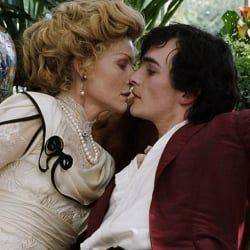Interview: Cheri Star Rupert Friend

Rupert Friend knows he probably wasn't the first choice for the title role of Cheri, and when you mention that he's yet another star that Stephen Frears plucked out of obscurity to stardom, he doesn't take offense. But Friend, also known as Keira Knightley's boyfriend and as the dastardly Wickham in Joe Wright's Pride & Prejudice, may very easily be the Next Big Thing, a sexy Englishman with gorgeous eyes and, oh yeah, acting talent.
As the spoiled, lazy Cheri, who starts a six-year relationship with an older woman (Michelle Pfeiffer) mostly because he has nothing better to do, Friend is both the hero and the villain of his own story, a lover to Pfeiffer's character who also causes her the greatest grief. I spoke to Friend during a roundtable interview at the Cheri junket, where he walked in the room by himself, wearing a Hawaiian shirt that may or may not have been ironic. Check out what he said to say below, and underneath the interview watch our exclusive behind-the-scenes featurette about how Cheri got made. The movie comes out in select theaters this Friday.
How did you like the way you looked in this film? The clothes, the hair?
We had a lot of visual ideas about Chéri, one of them being the idea that he was sort of a devil and an angel. Physically he looked like a most angelic, sweet, sort of well-behaved boy, but he actually had the morals of a Lucifer. We also had the idea—Stephen and I—of a sort of ballerina matador in the way that he moved, working with Consolata Boyle on the costumes, we very much wanted to keep that element of dangerous grace, where you can be gliding through a room one moment, and pouncing the next with a barb or an action or a look. When I was preparing the role, an image that came to me very strongly was of this lazy tomcat on a hot, brick wall, sort of just lazily watching the world go by, but when a mouse came too close [knocks the table], it was a goner. That was something I felt as soon as I read the script .
Stephen Frears said they were looking for an American for your role, because Michelle Pfeiffer and Kathy Bates were American. But then you came in. Did you know that was what they were looking for when you came in for the audition?
Well, I was aware I was probably quite low on the list. And also that I was going to have to fight tooth and nail to get the part, when you have a script and a director of this caliber and a star like Michelle comes on, I should think there were many more high-profile actors than I am who were keen to play the role. So I think the script had some fingerprints on it.
Stephen is rather reticent in discussing his process and how he approaches working with actors. Could you tell us something about how you discussed where you were going with this role, and what he gave you each day as you approached the day’s shooting?
CINEMABLEND NEWSLETTER
Your Daily Blend of Entertainment News
I can understand his reticence, because I share it. I think that the process of trying to become somebody else, and obviously the director/actor relationship in trying to do that, is such a weird, undefinable thing. There’s definitely not a sit-down board meeting where you talk it all through, at least not with Stephen. It’s much more of an instinctive, felt thing.

What was your experience working with Michelle?
It was nothing but wonderful. She was a very, very generous actor and we established a trust early on, which was lucky because we had to do some very hard work together. Not just the more obvious intimate scenes, but the characters go through these 180-degree changes of emotions seemingly without reason, and you have to feel that you are dancing together, that one will catch the other. Otherwise it’s very exposing.
What did you do to build up that trust?
I don’t know. It just happened. We met the night before we were going to start shooting, and knew nothing of each other before then. Obviously I knew her work, she didn’t know mine. So we had a quick cup of tea, and then what I think happened was we left ourselves behind at that point and started to just inhabit the world we were creating.
Chéri must have been a hard character to play because it’s so indecipherable. It’s all inaction. Did you have any fears about playing a part like that? It can be a thankless part to play.
Definitely. One of the first walls that I came to was this statement that Léa makes, that she can’t criticize his character because he doesn’t seem to have one. Which for an actor, is a tricky thing, because obviously we are looking for character. A great way of finding out about somebody, as an actor, or even in life, is to find out what they want. That can give you a lot of clues about their behavior. But when somebody doesn’t seem to want anything, has everything he could possibly ask for, but doesn’t seem to want any of it, it is a very challenging onion to unpeel.
How do you make your character likable? Or was that not a concern?
I do not have a concern to make the character likable. I have a concern to play him truthfully. I believe that if you can discover something of the truth of a person, then you will start to understand, and to understand is to move towards, if not like, then at least an empathy of some kind. Colette wrote a very complicated young man, and I don’t think he was a standard, square-jawed hero—quite the reverse in many ways—and when you start to look at why that might have been: What has kept him a child for so long? Was it Léa’s fault? Could you put it at her feet? Is it his mother’s fault? Is it society’s faulty? Or was he just born that way? It’s more interesting than trying to paint a sympathetic picture every time.
There’s a transition in the film between Chéri being 19 to being 25. That’s a lot of aging in a really short time. What did you do in your performance to capture that six years, and the development of their relationship as well?
That six-year period also encompassed Chéri doing more of the same thing. And it’s that curious thing that you see nowadays among the very, very wealthy—the jet set, or whatever they’re called—where you have no money worries whatsoever, and when you’ve sailed in the biggest yachts, and gone to the best tailor, and eaten at the finest restaurants, and you’ve done that every night for six years, and you cannot buy a better bottle of wine than the one you’re buying every night, there’s a point, I think, in the human nature, where you just become incredibly bored of life. You start to become listless and apathetic, and lose your hunger. I think that what drives most of us as human beings is the want for something. You might have a hope, or a big dream, or a goal that you haven’t yet achieved. And when you take that away from somebody, whether by incarcerating them, or in Chéri’s case, by making them possibly over-privileged, you’re left with very little to live for, literally, so it was really trying to explore what six years of that sort of luxurious monotony might have done to somebody.
What do you have awaiting release that you can tell us about?
There’s a film called The Young Victoria, about the early life of Queen Victoria and Prince Albert, and their romance.
Are you Albert?
Yes. So a much more decent human being, on every level. Yeah, so that’s in the fall, I think, coming out here.
He was quite a remarkable man.
He was an extraordinary man, and the opposite of Chéri, in that he didn’t ever see his life’s work being done, and had this incredible sense of urgency, about his philanthropic work, about his commitment to his queen, the country that wasn’t even his, and all this in the face of immense opposition from the British people, and even from Victoria herself for awhile. He persevered through all of that to become the love of her life. I was trying to understand what it might be in a man to make a woman mourn for the next 40 years of her reign, never take the black off, build monument after monument to him. That was very inspiring to me.
What about Lullaby for Pi?
That was a lot of fun. That was a film that I did this year with Forest Whitaker and Clémence Poésy. It’s about a musician, so I learned the piano, I’m playing awashed-up jazz musician. It’s about a man who’s mourning his wife in a hotel room, and one day a girl bursts into the hotel room and locks herself in his bathroom and won’t come out, and they conduct a relationship through the closed door—they never see each other. So it’s full of music, and he’s a kind of raconteur, so it has lots of rambling musical stories. It’s a very different piece from other things I’ve done.
Staff Writer at CinemaBlend
Most Popular




